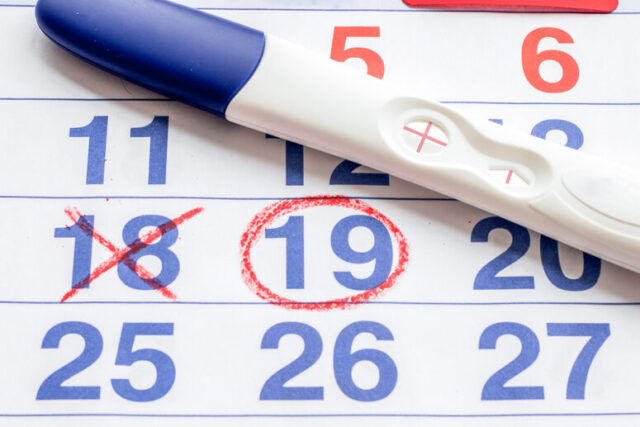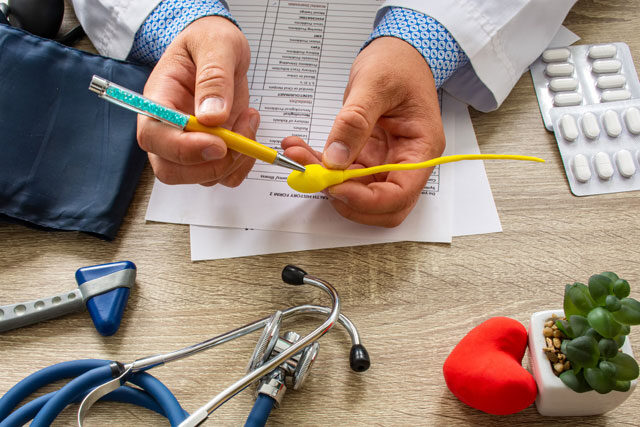Many women can go through several chemical pregnancies during their lifetime without even knowing that they’ve miscarried.Let’s have an in-depth look at how you can recognize this kind of miscarriage, what may cause it, and how to work through it.
What Is a Chemical Pregnancy?
A chemical pregnancy is an early miscarriage. A chemical pregnancy occurs if a woman is fertilized and the egg implants into the uterus for a short term only or doesn’t implant at all and leaves the uterus naturally.
Most women don’t suspect being pregnant as they lack typical pregnancy symptoms at such an early stage. It is also impossible to determine a clinical pregnancy, as the ultrasound won’t show any changes in the uterus or spot a heart rate due to the fetus stopping its development before 6 weeks of pregnancy.
The only way to learn about conception is by doing a pregnancy test since it reacts to the pregnancy hormone called hCG.An increase in hCG levels begins right after fertilization and can already be determined by a blood test 6 – 8 days after impregnation. If your pregnancy lasted for four or five weeks,you can also get a positive pregnancy test that involves urine testing.
A Chemical Pregnancy: Symptoms
Typically, women start suspecting pregnancy due to a late period. It’s often the very first clue at the early stages. However, a miscarriage can occur even before the mensesare due, so the pregnancy remains undiscovered by a woman.
Since the symptoms of a chemical pregnancy may ever occur, a woman may find out about her condition only in two cases. If she has done a pregnancy test before the missed periods. And if she has gone through in-vitro fertilization (IVF) and knows she should be pregnant.
If none of these can be applied to your situation, you may suspect going through a chemical pregnancy if your period starts a week or so later and is accompanied by the following signs:
- abnormal cramping;
- unusual heavy vaginal bleeding;
- abundance of blood clots in your menstrual discharge.
A lack of common early pregnancy symptoms even after a positive result on the test and dropping hCG levels are other signals of a chemical pregnancy.
Fortunately, an early pregnancy loss does not produce significant consequences to one’s physical health or ability to conceive. In fact, a woman can become pregnant within a short time after this kind of miscarriage. Still, processing the idea of a loss can take an emotional toll and require time for grieving.
Risks and Causes
First of all, there is little to nothing a woman can do to prevent a miscarriage at such an early stage, considering that most women don’t even know about their condition at that moment.
However, there are certain risk factors women should know about to have a chance to avoid an early miscarriage. They are:
- thyroid diseases;
- later pregnancies (women over 35);
- diabetes;
- inability to get pregnant naturally and use of IVF treatment;
- polycystic ovary syndrome (PCOS).
Women with such chronic disorders and diseases may have a harder time securing their pregnancies at an early stage. Also, there are a few additional factors that can intervene in a healthy course of a pregnancy:
- chromosomal problems with the developing baby;
- mother’s low body weight;
- imbalanced hormones;
- a fertilized egg is implanted outside of the uterus;
- infections.
The chromosomal abnormality is often the leading cause of chemical pregnancy. If this is the case, a fertilized egg is not developing after implantation. Still, the reasons and chances of going through a chemical pregnancy are mainly unknown.
To improve the chances of a healthy pregnancy, a woman can take active steps to get ready to bear a child. A change in lifestyle is the thing to start with. A woman should quit drinking, smoking, or taking any recreational drugs. Additionally, a woman can start taking prenatal vitamins. She may also consult healthcare specialists upon further steps in preparations for pregnancy.
How to Cope with an Early Miscarriage
Typically, the emotional consequences of a pregnancy loss are much greater than the physical ones. Hence, women trying to conceive should be aware of a chemical pregnancy, its incidence rates, and ways to cope with it.
In most cases, people will fall into a sense of loss and grief. Therefore, it’s important to enter this phase with strong coping mechanisms, practicing the following:
- Accept your feelings as real, valid, and important. It’s justifiable to feel what you feel at the moment as you have lost a pregnancy. It’s the right time to grieve.
- Take your time to grieve. All people grieve differently and at their own pace. Don’t set deadlines for grief. Instead, take one step at a time.
- Consider getting therapy or signing up for a support group. Such a decision will give you a safe space and a company to speak and share your fear and pain
- Don’t expect everyone to understand. People may have no idea what you are going through. It’s not because they don’t care for you. We all deal with pain differently.
- It’s normal to fear trying for another baby. However, overtime, this fear will go away, making way to hope and faith.
Chemical pregnancy symptoms – Bottom Line
A chemical pregnancy is unfortunate yet common these days. If you are trying for a baby, make sure to schedule a consultation with a doctor to learn more about personal risks and suited preventative measures for an early miscarriage.




